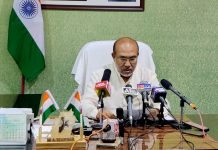The last eight years have seen a dramatic reversal in the once cold relations between India and the United States. Many in India believe that a tighter embrace with the US, especially a strategic military alliance and closer business ties, has been beneficial for India. How do you see India-US relations playing out in the coming years?
The closer business links may be beneficial for India’s capitalist class and some middle-class layers, but I doubt very much that this is the case for 70 percent of the population. The strategic military alliance is a short-sighted decision in my opinion. It makes India a US partner in the encirclement of China. Here there is little difference between the two major political configurations- Congress and BJP are both wedded to this policy and Indian-Americans exert a considerable pressure on this front. India is the weakest component of the BRICS states, in themselves not a very strong alternative. The obvious complementarity is with China, but this has been underplayed and those arguing in favour sidelined.
India and Israel have come a long way since 1992 when they established diplomatic relations. Today, India is the largest importer of military equipment from Israel. Business ties are also expanding exponentially between the two nations. Just what has made India forge such close ties with Israel when even some European nations keep Israel at arm’s length?
Money. But also the knowledge that close links with Israel open many doors within the United States. And a total indifference to Palestinian suffering. How could that not be the case when India’s treatment of Kashmiris is fairly similar. So a common colonial outlook draws them closer and in both cases the “enemies” are Muslim. So Israeli military advice in Kashmir is warmly welcomed.
The Iranian government and people have been stung by the U-turn in India’s historic compact with that nation. Tehran finds that unfair, citing its support for India, especially on Kashmir. Where do you see India-Iran relations headed?
Nowhere. For India the links with the United States/Israel are the centrepiece of its foreign policy.
Pakistan cites India’s presence in Afghanistan as an impediment to improving India-Pakistan relations. What role do you see for India in Afghanistan following the withdrawal of the US-led international military forces from that country next year?
I wish that was the only impediment. The US might want India to be its point-state after they leave, but they know fully well that Pakistan and Iran are crucial to any stable future. And of the two they prefer Pakistan. Depending on what government is formed, I think India’s role will be that of an important trading partner.
What do you think are the major fault lines between India and Pakistan that hold back peace?
The military in both countries needs an enemy to justify such obscenely high levels of military spending. Kashmir remains a barrier to a lasting peace, though I have long argued that a regional settlement of some sort is required for an agreement on Kashmir and the Tamil question in Sri Lanka. There are no political leaders in either country visionary enough to do a deal, but here India as the largest entity in the region is much more responsible. Indian national-egoism is now so pronounced that it barely thinks of its smaller neighbours. It sees itself as the equivalent of the US in Asia, which is a fantasy (I hope), though it is the largest US [partner] in the continent. Pakistan is a frontline [US] ally of convenience, its Army bought for a few billion dollars. India is considered a strategic ally.
India‘s relation with China appears to be the elephant in the room insofar as public debate in India is concerned. What are the key issues that India has with China, and how do you see them progressing now that a new leadership is in place in China?
The key issue has nothing to do with China as such. It is the US-Indian alliance. This is India’s priority and so China is kept at a distance. The brave Cabinet minister who suggested many years ago that a Sino-Indian alliance was the most rational choice was sacked by Manmohan Singh at lightning speed. Strategic choices. India could have developed close links with China, but chose to do so with the United States. Short-sighted and foolish, since the US is on the offensive in Asia. The traditionally servile Australian elite recently agreed to a new US military base in Australia with alacrity. All this accompanied by hard anti-Chinese talk. President Obama (certainly the most inventive apparition of the Empire since the Second World War) underlined the imperial presence in the Far East, stressing that the US was an Asian power and warning the Chinese to “play by the rules of the road”; rules that the Chinese know are formulated, interpreted and enforced by the US. India could have played a better role in all this, but global capital has displaced national sovereignty on some levels.













